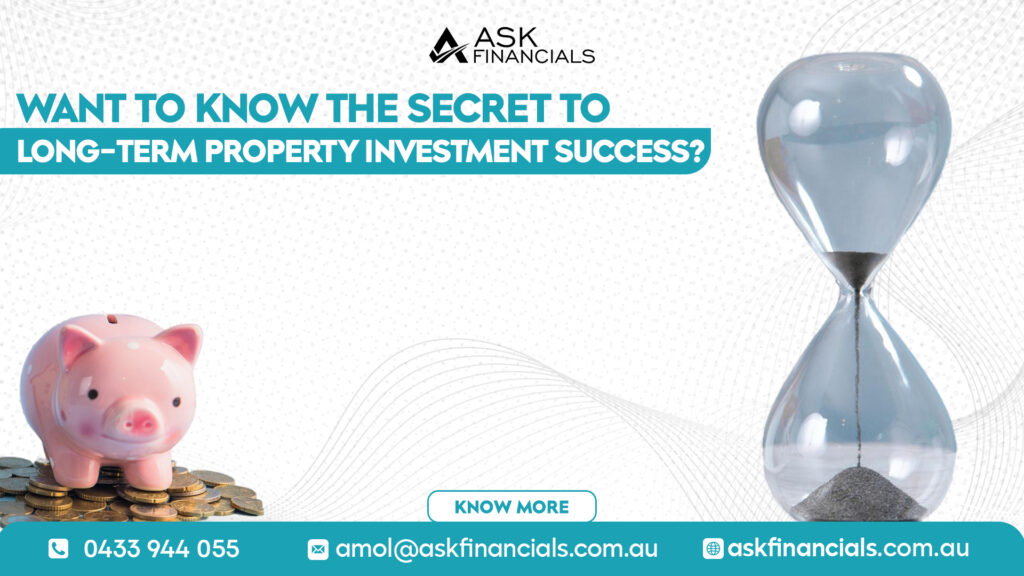Get easy tips for successful long-term property investment in Australia. Discover why location, maintenance, interest rates, and good financial planning are key. Get advice from ASK Financials to make smart property choices.
Oh, Hello there! It’s great to see you again. I’ve been trying to figure out why my neighbour is no longer interested in investing for quite some time now. He just confided in me that he has no idea what his long-term investment returns will be. He was worried about low income, market volatility, and RBA cash rates. From what I can see, everyone else is too busy worrying about the short-term fluctuations of the market to consider the long-term viability of any investment.
Is it your belief that the primary considerations for investing should be cash rates, market volatility, and an endless supply of income?
These should certainly be on your radar, but let’s approach them strategically. Just how? Let’s talk.
Starting with all the right information and direction might go a long way if you’re thinking about becoming a first-time investor in the Australian real estate market. Whether you’re just starting out with a single home or are planning to build an impressive portfolio, our comprehensive guide to investing in real estate in Australia will help you understand all of your possibilities.
With Australia’s economy showing no signs of slowing down, now might be a good moment to put property investment on your radar. If you complete your homework before you start investing, you’ll be more prepared for the road ahead.
We should have invested more in real estate twenty years ago. When we look at past property prices with the benefit of hindsight, we all wish we had invested more. Looking at a house worth several million dollars and realising that it was previously much cheaper is excruciating.
Generations have been afflicted by this condition. We always regret not buying more real estate when we were younger because we regret looking back on the pricing.
When purchasing real estate, whether for investment purposes or as a primary residence, several considerations must be given careful thought.
Here are seven things to keep in mind when you assess the potential of a property investment for the future.
The Importance of Your Property’s Location and Why It Matters So Much
Your investment property is like a single financial egg: it may either make or break your portfolio. Because of this, picking the correct spot is essential. This is the reason:
- Strive for locations where rental demand is high; you’ll be rewarded handsomely. Your revenue will remain consistent since there will be fewer vacancies and more potential tenants. Try to find a suburb that is either adjacent to a university or a commercial district, or one that has a growing population.
- Research the local market trends to have a better understanding of the market. How have rental yields and property values evolved through the years? Will there be any major events in the near future that might change the balance of supply and demand? Perform some research; it will help a lot.
- Going Beyond the Surface: Consider Future Initiatives Don’t let the allure of posh apartment complex amenities like pools or gyms fool you. These conveniences might cut into your profit margin due to the high maintenance expenses they often incur. Have a broader view: would the neighbouring construction of apartment buildings have an effect on rental yields?
Never Undervalue the Significance of Maintenance Expenses
Those last-minute fixes can quickly eat away at the value of your property. Take a look at these things:
- Avoiding Expensive Upkeep: Buildings with lifts, pools, and gyms may look appealing to renters, but they can be expensive to keep up.
- Investing isn’t passive; buying real estate as an investment takes constant work. Respond quickly to renter worries and check on the property often. Remember that a home that is well taken care of will draw good renters and last longer.
- Understanding the Numbers: Can you tell the difference between income costs (which you can remove from your rental income) and capital costs (which raise the value of the property)?
Talking to an investment property mortgage broker who knows about investing in real estate can help you get through these tricky situations.
Making sure you see the big picture: interest rates and macroeconomic events
There are other things going on besides the real estate market. These outside things can have an effect on your investment:
- Interest Rate: Interest rates can have a big effect on how much you pay each month for your mortgage. Put your earnings through a stress test by thinking about what would happen if interest rates went up by 2%. Are you still able to comfortably make the payments?
- Be ready for the unexpected: The economy can go down. Having extra money saved up can help you handle unplanned events and keep you from having to worry about money.
Think about the state of the economy. Learn about possible changes in interest rates and the economy, and make plans for them.
Take a Honest Estimate of Your Financial Situation
Take stock of your financial situation before you plunge into the real estate market:
- A solid credit score is required to get a decent loan, therefore it’s important to get yours checked.
- Life is unpredictable, therefore it’s important to have an emergency fund. You may protect your investment in real estate from the effects of unforeseen financial hardships by setting aside money in an emergency fund.
- Consider Your Exit Strategy: Will you be renovating and selling at a later date, or are you preparing for capital growth in the long run? Investing wisely requires a well-thought-out strategy.
The idea of owning property should not get you carried away. Prior to making any investments, take stock of your financial status and make a list of reasonable, attainable goals.
How to Think Like an Investor: Using Real Estate as a Business
If you buy in real estate with a business mindset, you will gain in the long run:
- Costs and Competitive Rents: Find out about the renting market in the place you want to live in. Set rental prices that are competitive to get renters and make sure you make a profit.
- When there are openings, plan for the downtime. There will always be openings. Put some of your rental income away as a safety net to cover these times and fixes that come up out of the blue.
- Setting long-term goals is very important: Are you looking for a steady rental income or a rise in value that you can sell later? If you know what you want, you can choose the right home and business plan.
- Spread your money around; don’t put all your eggs in one box! To reduce danger and get financial safety, you might want to add investments other than real estate to your portfolio.
To deal in real estate successfully, you need to think like a businessperson. For long-term success, make smart choices, plan ahead, and spread out your spending.
Have peace of mind with ASK Financials
Putting money into real estate may be a great way to build wealth and stability. If you want to be a successful real estate investor in Australia, follow these recommendations. You can confidently manage the market and accomplish your property objectives with study, smart financial preparation, and a business-minded attitude. And if you still feel stuck then ASK financials experts are there for you. Book a Discovery Call today & learn more about the details. Don’t forget that market research matters the most. Are you prepared to take on the real estate market?


